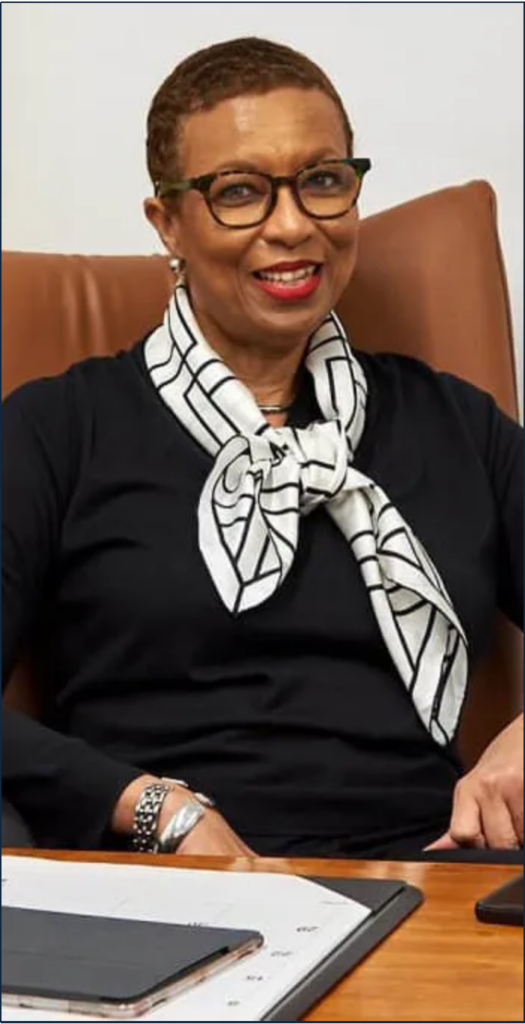Panellist Michael Imran Kanu is the Ambassador and Permanent Representative of the Republic of Sierra Leone to the United Nations. Photo courtesy of Michael Imran Kanu On XOn April 9, Hamilton welcomed three United Nations (UN) figures to speak on the role of small member states, particularly in promoting global security. The panel took place in the Kirner-Johnson Building’s Red Pit and was well-attended by students, faculty members, and since the event was open to the public, local community members.
The discussion invited H.E. Inga Rhonda King, Ambassador, Permanent Representative of St. Vincent and the Grenadines to the United Nations, H.E. Michael Imran Kanu, Ambassador, Permanent Representative of the Republic of Sierra Leone to the United Nations, and Ms. Kristel Lõuk, Deputy Permanent Representative of the Republic of Estonia to the United Nations. The panel was moderated by Professor Vandi Minah, the Sol M. Linowitz Visiting Professor of International Affairs.
Before King’s career in diplomacy, she worked in the private sector. She is also a business owner, management accountant, strategist, as well as the author of three books. King also has a strong background in mathematics and chemistry, holding a Bachelor of Science in the two fields. She also acted as the chair of the Investment Promotions Agency of Saint Vincent and the Grenadines, and the former Honorary Consul for Portugal to Saint Vincent and the Grenadines.
In addition to his position as the current Ambassador and Permanent Representative in Sierra Leone to the United Nations and the Representative of Sierra Leone at the United Nations Security Council, Kanu is also the Permanent Representative of Sierra Leone in the International Seabed Authority (ISA), a member of the Legal and Technical Commission of the ISA, and the Vice-President and Coordinator of the New York Working Group of the Assembly of State parties of the International Criminal Court (ICC), co-chairing the Review Mechanism of the ICC.
Ms Lõuk became a part of the Estonian Foreign Service in 2005, and before her role as the Deputy Permanent Representative of the Estonian mission, she acted as the Political Coordinator in the Estonian Mission to the United Nations, while Estonia was elected as a member of the United Nations Security Council. Ms. Lõuk also has served as Vice-President of the UNICEF Executive Board, while a Developmental and Humanitarian Affairs Counselor at the Estonian Mission to the United Nations.

H.E. Inga Rhonda King is the Ambassador and Permanent Representative of St. Vincent
and the Grenadines to the United Nations. Photo courtesy of John Penney/Pass Blue
Each of the presenters began the panel with individual speeches exploring themes of the United Nations Security Council, the role of small states in international security, and more. The first to speak was King, who began by highlighting how there are currently 55 conflicts “flaring” globally.
She also shared the strengths of the current International Order, including the multilateralism and connectivity it supports; however, she also noted how the effectiveness of the Order is dependent on the cooperation of the states and their prioritization of the common good.
King also highlighted the power of big nations, particularly in communicating messages. “Shaping narratives is what big states do best,” she said. This strength of big states further underscores the importance of small states coming together in solidarity. This unity can also be seen. according to King, between bigger and smaller states, for example in the collaboration between the A3 (the three African Nations in the UN Security Council) and St. Vincent and the Grenadines.
Lõuk began her presentation by highlighting how while the Republic of Estonia was a member of the League of Nations, it was not a founding member of the United Nations, due to the Republic’s struggles and occupation following World War II. Estonia eventually joined the organization in 1991, the same year the Republic gained independence. One particular issue emphasized by Lõuk was cybersecurity. She explained how in a time without a significant emphasis on the pressing issue of cyberattacks in the Security Council, Estonia pushed for greater conversation and awareness on the issue.
Finally, Kanu shared how even though large states are a significant component of the UN Security Council, “the glue is the small states.” Kanu also cited the crucial question of the panel: “Can small states seize the moment and save the world?” In response, Kanu saw two answers — “no” and “yes, but.”
The panel then opened up to questions from the audience, the first of which was whether there exists an agreement to be aligned among the small states. King replied noting that there is an attempt to revive a “non-align movement”. She also highlighted how ultimately, states are not rational, but realists.
The next question asked whether large states seek the council of small states. King replied highlighting how small states tend to jump into vacancies and take on “various leadership roles across committees… we will set aside our interests for the greater good, whereas you will see big powers like India, Brazil, or Germany… it’s very different…” She concluded saying, “Yes, they come to us very often… we remain indispensable. ”
The conversation continued to flow between panellists and attendees, including Professor Jumet of the Government department, who inquired regarding the differences in how Global Northern and Global Southern States take on issues.
The event encouraged conversation regarding the vitality of small states, particularly concerning the UN Security Council and alliances with powers of all sizes.
